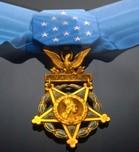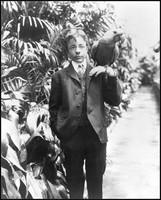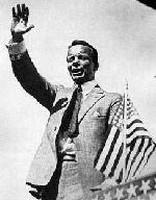White House Heroes, Part I
© John S. Cooper
Originally published: April 19, 2002
Many well-known and celebrated heroes have lived in the White House. Some have gotten to the White House on the popularity of their reputations as heroes. But not all the heroes who lived in the White House were adults at the time. A number of White House children have gone on to do great things in their own right. Two were recognized as genuine heroes when they received the Medal of Honor (also called the Congressional Medal of Honor), our nation's highest award for gallantry and courage.
Theodore Roosevelt, Jr., was born September 13, 1887 at Oyster Bay, New York. Teddy, Jr. was much like his father in both looks and mannerisms. His personality and his career were also much like his father’s. Ted, Jr. grew up in his father’s image, engaging in what his father called “the active life” and enjoying the outdoors and sports.
Teddy, Jr. graduated from Harvard. He married Eleanor Butler Alexander on June 20, 1910 in New York City, and they had four children together. He was commissioned a major in the army in 1917. (His father also volunteered, but was turned down for political reasons. President Woodrow Wilson had no love for TR, and did not want him leading a division in combat.) During World War I, Teddy, Jr. earned promotion to lieutenant colonel. He was wounded and gassed at the Battle of Soissons. He later commanded an infantry regiment at the Battle of the Argonne. He was awarded the Purple Heart, the Distinguished Service Medal, and the Distinguished Service Cross, second only to the Medal of Honor as the United States’ highest medal for valor.
After the armistice, Ted, Jr. entered politics. He was elected to the New York State Assembly in 1919, and was appointed assistant secretary of the navy in 1921 by President Warren Harding. Ted Jr. became an unwitting accomplice in the infamous Teapot Dome scandal. As assistant Secretary of the navy, he facilitated the transfer of the Teapot Dome oil reserve lands from the Navy Department to the Department of the Interior. He had no part in the illegal or unethical actions of those involved, and no blame ever attached to him.
Ted Jr. ran for governor of New York in 1924, but lost to the popular Al Smith. He was appointed governor of Puerto Rico by President Calvin Coolidge and served from 1929-1932. He was then appointed governor of the Philippines by President Hoover and served from 1932-1933. In World War II, he served as a brigadier general, and the assistant commander of the 4th Infantry Division.
Ted Jr. received the Medal of Honor for his actions on D-Day, leading his men on Utah Beach during the Normandy landings. He had twice asked to lead his men during the landings, but his request was rejected. He then put the request in writing, which made it harder to turn down, and it was approved.
Ted Jr. was the first Allied general officer to wade ashore and the only general officer in the first wave during the amphibious assault. Navigational errors caused by bad weather and strong currents, resulted in the first wave of the amphibious assault landing in the wrong inlet, a mile or two from the intended landing zone. It was, however, less heavily defended than the original objective, and Roosevelt ordered the rest of the troops and supplies to land where his men were mistakenly put ashore. He was quoted as saying, “We’ll start the war from here!” (Henry Fonda, who played Ted Jr. in the film “The Longest Day”, delivered that famous line.)
The 4th Division moved rapidly inland and overwhelmed enemy positions in their way. They linked up with the airborne forces inland sooner and with fewer casualties than any of the divisions on any of the other beaches. Roosevelt led a series of assaults at different parts of Utah Beach, carrying only a pistol and walking with a cane due to his arthritis. General Omar Bradley, commander of the U.S. 1st Army and overall commander of the Normandy landings, called Roosevelt’s actions on Utah Beach the single bravest act he witnessed during the entire war. Roosevelt’s youngest son also landed in the first wave, but on Omaha Beach. This son was named Quentin II after Ted Jr’s younger brother who was a pilot shot down during World War I. This made Ted Jr. and Quentin II the only father and son to land on the Normandy beaches that day.
Theodore Roosevelt, Jr.’s Medal of Honor Citation reads:
Rank and organization: brigadier general, U.S. Army. Place and date: Normandy invasion, 6 June 1944. Entered service at: Oyster Bay, N.Y. Birth: Oyster Bay, N.Y. G.O. No.: 77, 28 September 1944. Citation: for gallantry and intrepidity at the risk of his life above and beyond the call of duty on 6 June 1944, in France. After 2 verbal requests to accompany the leading assault elements in the Normandy invasion had been denied, Brig. Gen. Roosevelt's written request for this mission was approved and he landed with the first wave of the forces assaulting the enemy-held beaches. He repeatedly led groups from the beach, over the seawall and established them inland. His valor, courage, and presence in the very front of the attack and his complete unconcern at being under heavy fire inspired the troops to heights of enthusiasm and self-sacrifice. Although the enemy had the beach under constant direct fire, Brig. Gen. Roosevelt moved from one locality to another, rallying men around him, directed and personally led them against the enemy. Under his seasoned, precise, calm, and unfaltering leadership, assault troops reduced beach strong points and rapidly moved inland with minimum casualties. He thus contributed substantially to the successful establishment of the beachhead in France .
Theodore Roosevelt, Jr. died of a sudden heart attack on the Normandy battlefield on July 12, 1944, just five weeks after the D-Day action for which he was awarded the Medal of Honor. He died just before word arrived that he had been promoted to Major General and assigned to the command of a division of his own. President Franklin Roosevelt, a cousin of his, presented the Medal of Honor to Ted, Jr’s widow with the words, “His father would have been the proudest.”
Some of Teddy Roosevelt, Jr's awards, in order:

1. Medal of Honor (aka Congressional Medal of Honor)

2. Distinguished Service Cross

3. Distinguished Service Medal

4. Purple Heart

Young Teddy, Jr enjoyed the outdoors, and like his father, hunted

Teddy, Jr with his macaw, Eli

Teddy, Jr while serving as governor of Puerto Rico
The copyright of the article WHITE HOUSE HEROES, PART I is owned by John S. Cooper. Permission to republish WHITE HOUSE HEROES, PART I in print or online must be granted by the author in writing.
MS/HS Social Studies / Alumni Director
- Teacher Home
- Article of the Week
-
Published Articles
- White House Heroes, Part I
- Presidential Children: The Adams Family Children
- Presidential Children: Teddy's "White House Gang"
- A Dead End Job: Madison's Vice President
- Rum, Romanism, and Rebellion: The Election of 1884
- Substitute First Lady: Harriet Lane
- Robert Todd Lincoln: Reluctant Witness to History
- Dolley Madison: An American Original
- The Wit and Wisdom of Abraham Lincoln, Part I
- Almost President: Benjamin Wade
- Death in the White House
- A Tale of Two Tickets, Part I
- A Tale of Two Tickets, Part II
- Acting Vice President, Part I
- Acting Vice President, Part II
- The Case for the Electoral College
- Chat Room
- Links
- Photo Albums
- Trivia Questions
- U.S. History 8
- Presidential History Honors
- Middle School Geography
This site provides information using PDF, visit this link to download the Adobe Acrobat Reader DC software.
